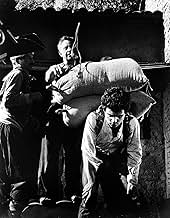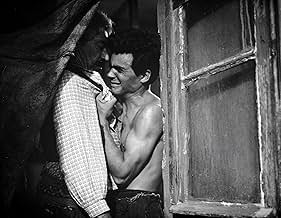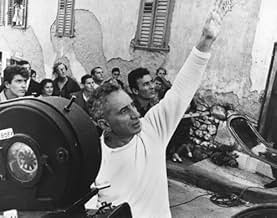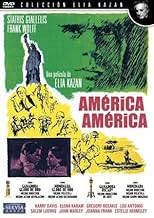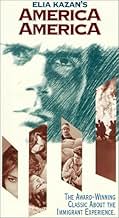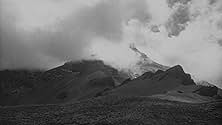NOTE IMDb
7,7/10
6,3 k
MA NOTE
Un jeune Grec ne reculera devant rien pour s'assurer le passage vers l'Amérique.Un jeune Grec ne reculera devant rien pour s'assurer le passage vers l'Amérique.Un jeune Grec ne reculera devant rien pour s'assurer le passage vers l'Amérique.
- Réalisation
- Scénario
- Casting principal
- Récompensé par 1 Oscar
- 7 victoires et 12 nominations au total
Garrett Cassell
- Dog Walker
- (non crédité)
Tom Holland
- Voice Overs
- (voix)
- (non crédité)
Elia Kazan
- Self
- (voix)
- (non crédité)
Avis à la une
Absolutely loved the idea for the story, and love it when films take on a very personal approach. Something that 'America America' did and one can tell from as early on as the opening voice over. Elia Kazan made so many great films and seldom made a bad one (even his worst, for me between 'The Sea of Grass' and 'The Visitors', is not that bad), he was a fine director and an influential one. Especially in his distinctive directing of actors, and one of the best at it, and it is a shame that his politics and testimony harmed somewhat his reputation.
For me, 'America America' is not one of Kazan's best films and others have a bigger influence in film and on me. There is plenty though of what made Kazan so great a director and why his high regard was richly deserved. 'America America' to me was still a great film, perhaps his most personal out of all his films (almost auto-biographical, with it being based on the experiences of his own uncle) and it was very difficult to not admire it.
Inexperience at times shows in the acting of Stathis Giallelis, with there being times where he seemed unsure. When it comes to nit-picks regarding 'America America' that is pretty much it.
Giallelis mostly does very well in his role, not easy handling a big and difficult role so young but he does understated wonders in his best moments. Where Kazan also shows his great skill in how he managed to get the best out of his actors (much of the best of his performances from his films, in a list that includes Vivien Leigh, Marlon Brando, James Dean, are iconic), even those that were not always great or inexperienced. The rest of the acting is every bit as good, especially from Linda Marsh, Paul Mann and best of all Lou Antonio.
Kazan's direction is exemplary, keeping one riveted throughout the long running time. 'America America' is a very well made film, beautifully lit and framed and was really intrigued by its documentary-like style in how it was shot without being heavy-handed. The Oscar win for the art direction was richly deserved. The music score is great in its authenticity and makes one feel that you are there where the film is set.
The script also garnered award attention and understandably so, as it is very thought-provoking, can be quite gritty and doesn't sugar coat. The opening voice over is a very good indication of what to expect, making it very clear that it was a personal effort for Kazan without being egotistical. The story is long in length while not being long-winded, and is both touching and suitably uncompromising.
Summarising, truly great. 9/10
For me, 'America America' is not one of Kazan's best films and others have a bigger influence in film and on me. There is plenty though of what made Kazan so great a director and why his high regard was richly deserved. 'America America' to me was still a great film, perhaps his most personal out of all his films (almost auto-biographical, with it being based on the experiences of his own uncle) and it was very difficult to not admire it.
Inexperience at times shows in the acting of Stathis Giallelis, with there being times where he seemed unsure. When it comes to nit-picks regarding 'America America' that is pretty much it.
Giallelis mostly does very well in his role, not easy handling a big and difficult role so young but he does understated wonders in his best moments. Where Kazan also shows his great skill in how he managed to get the best out of his actors (much of the best of his performances from his films, in a list that includes Vivien Leigh, Marlon Brando, James Dean, are iconic), even those that were not always great or inexperienced. The rest of the acting is every bit as good, especially from Linda Marsh, Paul Mann and best of all Lou Antonio.
Kazan's direction is exemplary, keeping one riveted throughout the long running time. 'America America' is a very well made film, beautifully lit and framed and was really intrigued by its documentary-like style in how it was shot without being heavy-handed. The Oscar win for the art direction was richly deserved. The music score is great in its authenticity and makes one feel that you are there where the film is set.
The script also garnered award attention and understandably so, as it is very thought-provoking, can be quite gritty and doesn't sugar coat. The opening voice over is a very good indication of what to expect, making it very clear that it was a personal effort for Kazan without being egotistical. The story is long in length while not being long-winded, and is both touching and suitably uncompromising.
Summarising, truly great. 9/10
Imagine a film like "The Godfather" receiving almost no audience, relegated to the occasional appearance on the AMC channel, barely being released on VHS or DVD, and you will have some idea of the tragic fate of this lost epic masterpiece. As hard as it is to believe, this may be the prolific director Elia Kazan's greatest film achievement, yet hardly anyone has seen it. This is a film on the epic scale of "The Godfather," about a young Armenian man's escape from Turkish persecution, flight from Anatolia, and eventual immigration to Ellis Island - all based upon the the experiences of the director's uncle. What is also tragic is the fact that I can think of no other film which portrays the cruel persecution and genocide inflicted upon the Armenian minority by the Ottoman Turks in the early 20th century (which Hitler correctly pointed to as proof that the world would look the other way at the genocide he had planned in Europe in the 1930s). Every period detail in the film is perfect, from the Oscar-winning costume design to the set design, Greek folk music score, veteran Haskell Wexler's cinematography, and acting - especially lead actor Giallelis, whose intensity brings to mind some of Brando's early work.
It is obvious that this film was a very personal piece of film-making for Kazan. And though I don't want to dwell as others do on Kazan's checkered past in his naming of communist colleagues for HUAC in the 1950s, it is interesting to note a parallel in the main character Stavros' personal anguish in making the choice to leave his wealthy wife and use her money to immigrate to the United States; both men made the conscious decision to drive a wedge between them and their past relationships. This is truly a film for all Americans to treasure, and if I had my way, I would make sure it was broadcast every 4th of July just as "It's a Wonderful Life" is broadcast every Christmas. As a nation of immigrants and descendants of immigrants, this is a film virtually every American can relate to. I can't figure out why it is so obscure.
It is obvious that this film was a very personal piece of film-making for Kazan. And though I don't want to dwell as others do on Kazan's checkered past in his naming of communist colleagues for HUAC in the 1950s, it is interesting to note a parallel in the main character Stavros' personal anguish in making the choice to leave his wealthy wife and use her money to immigrate to the United States; both men made the conscious decision to drive a wedge between them and their past relationships. This is truly a film for all Americans to treasure, and if I had my way, I would make sure it was broadcast every 4th of July just as "It's a Wonderful Life" is broadcast every Christmas. As a nation of immigrants and descendants of immigrants, this is a film virtually every American can relate to. I can't figure out why it is so obscure.
"America, America" is a movie made with the soul. It is a hair-raising movie about the immigrant experience, made by artists temporarily outside the Hollywood cage. It is about the struggle to be human in a world that bites at you, and it is about naked desire. "America, America" is a film about a young man with ichor in his arteries, made by people with ichor in their arteries.
Stavros is a young Greek from Anatolia, a youth with burning eyes, full of ethos as well. He yearns to live a life away from degradation (Greeks in Anatolia were a despised minority). This movie shows his peregrination to America, in three of the shortest hours I've ever lived. It shows a cycle of being broken and rebuilt over and again, the death of illusions, the obduracy of hope, and the rack of desire.
Haskell Wexler deserves special mention as he quite frequently produced jaw-dropping shots in this movie. There is a scene in this movie where Stavros is sat next to an older woman, Sophia (sat together like panthers watching an ape play with jackals), and the electricity between them, established entirely visually, is a devastation.
The editing from Dede Allen, is similarly special, and you can see that Kazan acknowledged all this creative talent as he reads out all the names of the major creative staff at the end over the credits. One particularly beautiful effect was a dissolve the last time we see Stavros' mother, where her face persist on the screen for a moment, almost as if she has become a ghost.
You absolutely must see this movie.
Stavros is a young Greek from Anatolia, a youth with burning eyes, full of ethos as well. He yearns to live a life away from degradation (Greeks in Anatolia were a despised minority). This movie shows his peregrination to America, in three of the shortest hours I've ever lived. It shows a cycle of being broken and rebuilt over and again, the death of illusions, the obduracy of hope, and the rack of desire.
Haskell Wexler deserves special mention as he quite frequently produced jaw-dropping shots in this movie. There is a scene in this movie where Stavros is sat next to an older woman, Sophia (sat together like panthers watching an ape play with jackals), and the electricity between them, established entirely visually, is a devastation.
The editing from Dede Allen, is similarly special, and you can see that Kazan acknowledged all this creative talent as he reads out all the names of the major creative staff at the end over the credits. One particularly beautiful effect was a dissolve the last time we see Stavros' mother, where her face persist on the screen for a moment, almost as if she has become a ghost.
You absolutely must see this movie.
I saw America America way back when I was a teen and had not seen it since till
today. I was surprised at how much I remembered of it. It was like reliving tales
told by my grandparents and some of their siblings of their immigration stories.
In this case this was fashioned tales of Elia Kazan's parents and their siblings woven together to create an immigrant story. It's not pretty at times and the black and white cinematography accents the harshness of the experience.
Kazan's protagonist is young Stathis Giallelis and a few familiar character actors are in the cast. No box office names though to accent the reality of the story. Giallelis is a Greek in Turkish Anatolia, a place where during the Ottoman Empire persecuting Greeks and Armenians was a national pasttime. Not that persecution led to any kind of solidarity, the two minorities had it in for each other as much as the Turks.
Giallelis hears of America, a fabled land where this sort of organized persecution and permanent status at the bottom of society doesn't happen. He resolves to go, but his family only sends him as far as Istanbul (as Greeks they still call it Constantinople)to help out one of the relatives.
He hears the fare is 110 English pounds and one way or another he's going.
The last 15 minutes or so is when Giallelis arrives and there's a compelling montage of immigrants including our protagonist doing all kinds of menial jobs that we who are here won't do. It's no different today with the current folks who want to come here, the ones our current administration is bent on scapegoating for its own purposes. Look folks, that montage tells more than the Kazan family story. it's your story or mine unless you were born an American Indian.
And speaking for the Kogans, Lucyshyns, Scrobacks, and Fleischmans, I'm glad Elia Kazan made America America and told the tale.
In this case this was fashioned tales of Elia Kazan's parents and their siblings woven together to create an immigrant story. It's not pretty at times and the black and white cinematography accents the harshness of the experience.
Kazan's protagonist is young Stathis Giallelis and a few familiar character actors are in the cast. No box office names though to accent the reality of the story. Giallelis is a Greek in Turkish Anatolia, a place where during the Ottoman Empire persecuting Greeks and Armenians was a national pasttime. Not that persecution led to any kind of solidarity, the two minorities had it in for each other as much as the Turks.
Giallelis hears of America, a fabled land where this sort of organized persecution and permanent status at the bottom of society doesn't happen. He resolves to go, but his family only sends him as far as Istanbul (as Greeks they still call it Constantinople)to help out one of the relatives.
He hears the fare is 110 English pounds and one way or another he's going.
The last 15 minutes or so is when Giallelis arrives and there's a compelling montage of immigrants including our protagonist doing all kinds of menial jobs that we who are here won't do. It's no different today with the current folks who want to come here, the ones our current administration is bent on scapegoating for its own purposes. Look folks, that montage tells more than the Kazan family story. it's your story or mine unless you were born an American Indian.
And speaking for the Kogans, Lucyshyns, Scrobacks, and Fleischmans, I'm glad Elia Kazan made America America and told the tale.
This is a superb piece of filmmaking which has, unfortunately, been all but forgotten. The only weakness is in its star (Stathis Gialellis), but the film is so good that it doesn't matter (and, on second viewing, he's really not all that bad). I have seen this film many, many times on video and once I was privilaged to see it on on the "big Screen" at the Los Angeles County Museum of Art. I highly recommend it. The black and white cinematography by Haskell Wexler is top-notch. This film is a testament to the human spirit.
Le saviez-vous
- AnecdotesOf all the films he had directed, this one was Elia Kazan's favorite film, as it was very personal to him.
- GaffesAn old woman is humming a tune from Astor Piazzolla's Libertango in the 1900s, decades before the composer was even born.
- Citations
Elia Kazan: [Voice- over] My name is Elia Kazan. I am a Greek by blood, a Turk by birth and an American because my uncle made a journey.
- Crédits fousDirector Elia Kazan narrates the main portion of the closing credits, reading the words as they appear on the screen, using complete sentences such as "The cinematography was by Haskell Wexler."
- ConnexionsEdited into Grand format: Amérique, notre histoire (2006)
- Bandes originalesExcitement In The Village
Meilleurs choix
Connectez-vous pour évaluer et suivre la liste de favoris afin de recevoir des recommandations personnalisées
- How long is America America?Alimenté par Alexa
Détails
- Durée2 heures 54 minutes
- Couleur
- Rapport de forme
- 1.85 : 1
Contribuer à cette page
Suggérer une modification ou ajouter du contenu manquant







